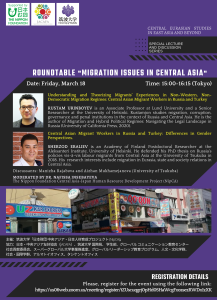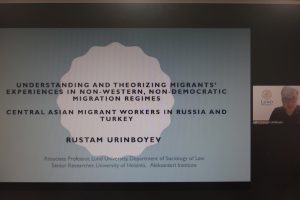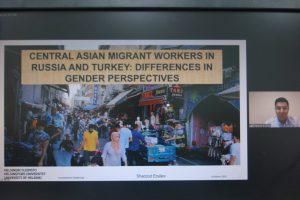On Friday, March 18th, 2022, the Nippon Foundation Central Asia-Japan Human Resource Development Project (NipCA) and the Special Program in Japanese and Eurasian Studies (University of Tsukuba) invited Dr. Rustamjon Urinboyev (Lund University) and Dr. Sherzod Eraliev (University of Helsinki) to speak at the roundtable dedicated to the migration issues in Central Eurasia.
The roundtable took place online via Zoom and was open to the public. The event was a part of the Special Lecture and Discussion Series “Central Eurasian Studies in East Asia and Beyond”, which consists of several seminars designed to highlight the most prominent findings and research studies in the field.
Dr. Urinboyev started his lecture by briefly talking about his background as a Central Asian researcher based in Sweden and introducing his upcoming book on migration (co-authored with Dr. Eraliev) to be published by Palgrave Macmillan. Dr. Urinboyev then introduced the audience to the existing migration regime literature, which is dominated by the studies conducted in or pertaining to Western liberal democracies. He highlighted that major non-Western migration destinations remain underrepresented in comparative and theoretical debates. Dr. Urinboyev emphasized that their new study with Dr. Eraliev fills this vacuum by comparing the experience of Central Asian migrants in Russia and Turkey.
The roundtable continued with Dr. Eraliev`s talk on the differences in gender perspectives. Dr. Eraliev discussed the peculiarities of Central Asian cultures, which contribute to the divergence of female migrants. According to Dr. Eraliev’s findings, female migrants usually fall into four categories: wives accompanying husbands, divorced women or single mothers, women whose husbands remain at home or are migrants in another country, and education migrants. It was highlighted that gender composition reflects migrant labor market structure and racism and abuse (including from fellow migrants) remain widespread.
Two current NipCA fellows Manizha Rajabova and Aizhan Mukhamejanova joined the roundtable as discussants and reflected on the presentations relying on the findings of their current research projects dedicated to the migration issues in Central Asia.
During the Q&A session, the audience asked the speakers many questions about the challenges that they have faced during the data collection process and inquired about the theoretical contribution of their upcoming book. The presentation was recorded and will be shared on the program’s Youtube channel: https://www.youtube.com/channel/UCtgSe6atrw84WOQTyo4iUkA
The Lecture Series will continue with the next public seminar scheduled for April 25th at 12:15 PM (Tokyo).





